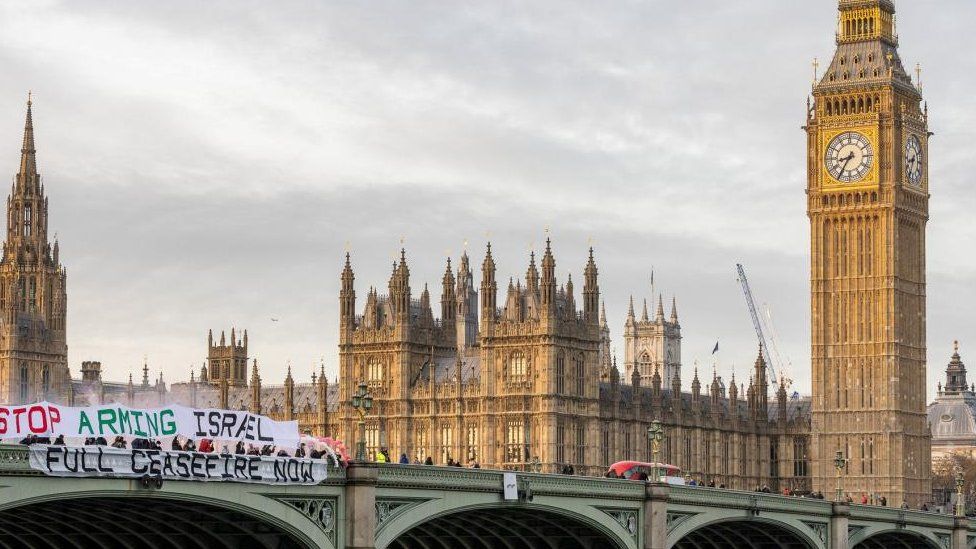ARTICLE AD BOX
 Image source, 2023 Mark Kerrison
Image source, 2023 Mark Kerrison
Protesters line the bridge outside the Houses of Parliament last year
By Chris Mason, political editor
BBC News
Today's debates at Westminster over the UK's outlook on the Israel-Gaza conflict are rooted in domestic politics.
The genesis of the whole thing is what is known as an Opposition Day debate which the Scottish National Party have been granted.
Even before the row of last week about Labour's candidate in the Rochdale by-election who is no longer Labour's candidate, the SNP planned to use this debate to set out what they see as their distinctive position among Westminster's biggest parties at least on the conflict - their desire, going back some time, for an "immediate ceasefire".
They see themselves as "Westminster's conscience" on the issue and wanted to press home that position.
The SNP are keenly aware of the political tussle they currently confront: a resurgent Labour Party which threatens their dominance in Scotland and threatens to snaffle a considerable number of current SNP seats at the general election.
So pointing out points of difference with Labour is key and they profoundly believe Labour has been in the wrong place for too long, in hugging the government's position very closely and explicitly avoiding calling for an immediate ceasefire.
Labour, meanwhile, believe they have a duty to act as a government in waiting and behave as they would if they were in government.
But, confronted by this debate, Labour had a choice to make.
And yesterday, for the first time, they did say they backed an "immediate ceasefire" and so the gap between the SNP and Labour positions narrowed.
Senior Labour folk tell me their position is nuanced and also reflects the changing picture in the region and among the UK's allies.
Labour say it is an essential condition of a ceasefire that Israel feels secure and there is the prospect of a viable Palestinian state - neither of which are straightforward objectives, however laudable or otherwise.
The SNP counter that the two parties' positions are now very close and welcome that.
But this is where parliamentary procedure throws up a twist.
The government has set out its own position in an amendment to today's debate.
It is not changing its position but the language is different from Labour's - despite how close the two frontbenches have been since October.
And those within Labour who have been sceptical about Sir Keir Starmer's approach - feeling it has been too pro-Israel and insufficiently focused, until now at least, on a ceasefire - are not likely to be convinced by it.
And here's the rub: in debates like this, the convention is the motion itself, the SNP's position, will be voted on, as will the government's position. But not necessarily Labour's.
If that comes to pass, what do Labour do?
They could choose to abstain, but there is a risk for Sir Keir in that scenario that some of his MPs feel obliged to back the SNP motion to register their desire for an immediate ceasefire.
Net result, potentially: Labour looks divided.
Now, you might be reading this thinking what on earth has this actually got to do with what is happening in Israel and Gaza? And what difference does any of this make to the UK's position on the conflict?
The short answer is: it will make no difference.
The longer answer is Labour is a party that aspires to be in government in a matter of months, and has found itself in some awkwardness at the very least ever since the Hamas atrocities in Israel in October.
That awkwardness continues - as we see in Rochdale.
And Labour's two biggest opponents - who themselves argue they have clear, consistent (albeit different) positions - are not averse to pointing out Labour's difficulty on one of the biggest foreign policy issues of the day.

 10 months ago
96
10 months ago
96








 English (US) ·
English (US) ·